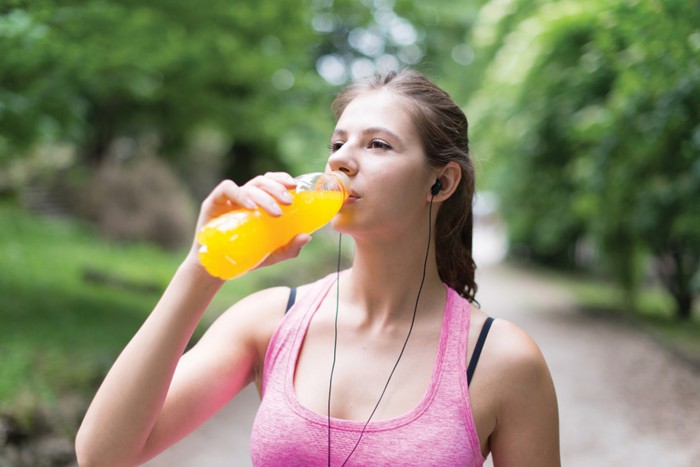While water can keep you hydrated on the long run, sports drinks give back the carbs, sodium and potassium lost in long-haul, high-intensity events. – BY CHRISTINE PETERS, REGISTERED DIETICIAN
When you exercise, you produce heat, which your body controls through sweating, but you can then steadily become dehydrated, especially if running in high heat or humidity. As little as 2% dehydration can affect your athletic performance, so athletes are told to drink regularly and top up on fluids. Now, if you are running for less than 60 minutes, water should be enough to stay hydrated and save kilojoules, but if running longer than 60 minutes, sports drinks are recommended.
Therefore, sports drinks are recommended for endurance athletes trying to reach peak performance, especially if sweating a lot, because they provide fluids to cool down your body and replace what you lost in sweat, carbohydrates for quick energy, and sodium and potassium, the chief minerals lost in sweat.
Of course, fluid needs vary from person to person, and according to the type of activity and the length of time that you are active, but as a general rule of thumb, runners should:
• Drink one to two cups of sport drink four hours or less before exercise.
• Keep fluids with you when you run and sip regularly to replace water lost through sweat, but let your thirst guide you.
• Post-run, eat your meals and snacks and drink as you feel you need to, but especially drink up to 1.5 cups (375 ml) of fluid if you have not produced any urine, or only a small amount of bright yellow urine.
• Water is always a good option post-run, but you can also drink milk or chocolate milk, 100% fruit juice or another sports drink.
What to Look For
1. Water: Make sure your sports drink is not carbonated, so it is easy to drink and doesn’t make you feel full.
2. Sodium: The white powder on your clothes or skin is the salt you lose in sweat, and this loss can lead to muscle cramps, so sports drinks should contain at least 300 to 700mg of sodium per litre. Athletes prone to cramping may require more.
3. Carbohydrate (sugar): Sugar keeps blood glucose from dropping and helps fuel active muscles and the brain, so 30 to 60 grams of carbohydrate per hour of activity can improve endurance, power output and delay fatigue. To prevent stomach problems, make sure your drink has no more than 80 grams of carbohydrate per litre, as that is generally the limit of what your body can easily absorb.
4. Flavour: Drinks with flavour are easier to swallow, especially when you’re tired.
Most importantly, experiment with a new sports drink in training first before using it in a race, as you don’t want to find out mid-race that something doesn’t work for you, or disagrees with your stomach!
About the Author
Christine is a registered dietician based in the Johannesburg area.


